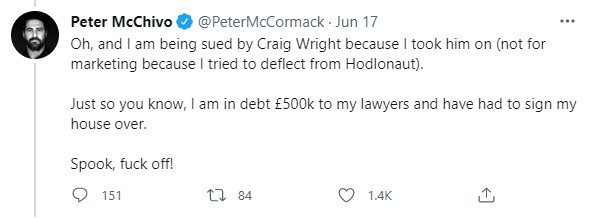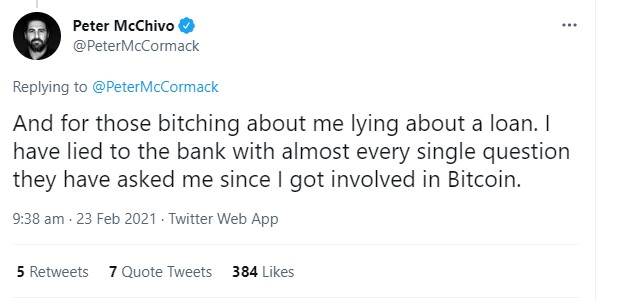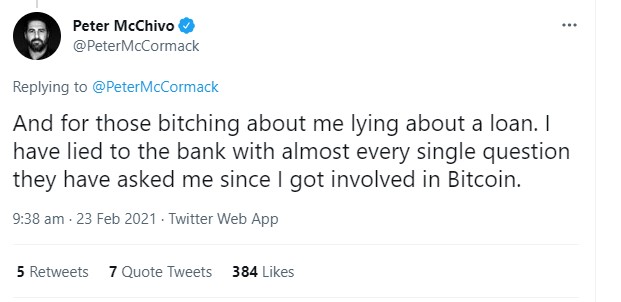One of the more frustrating things about Dr. Craig Wright’s battle with his critics is that so few of his lawsuits end up going to trial or even reach a courtroom at all. This isn’t a choice on the part of Dr. Wright, who has been pursuing litigation consistently. Rather, what his critics have in common is that when it comes time to put up or shut up, they universally chosen the latter.
(adsbygoogle = window.adsbygoogle || []).push({});
Dr. Wright’s desire to take these people to court is perfectly rational. When it comes to challenging allegations of fraud and deceit, the court is the only appropriate way to seek a resolution. It isn’t practical or desirable to mediate disputes of this kind over Twitter, where users are under no direct obligation to act honestly and there is no mechanism by which evidence can be produced and examined. In court, the question can be litigated in the full light of the available evidence and parties must swear to the truth of their representations.
As a result, the court is the perfect venue for resolving disputes, particularly those involving allegations of fraud or, on the other side of the coin, libel. Why, then, are all of Dr. Wright’s critics so keen to avoid it?
Wright v McCormack
Dr. Wright’s lawsuit against BTC blogger Peter McCormack shows exactly why, and that’s purely because it’s the furthest along.
It started with a Twitter campaign in which McCormack called Dr. Wright a fraud and begged for Dr. Wright to sue him for libel. Dr. Wright did sue him for libel. This briefly inspired some financial support for McCormack from Tether until both sides had to present their evidence in the case, at which point Tether decided it wanted no part of McCormack’s self-inflicted wounds: they hit the eject button, leaving McCormack with no choice but to abandon his defense entirely—albeit briefly.
The case is currently still awaiting resolution, though McCormack’s legal team are no longer using truth as a defense to the libel claims against him. McCormack himself has gone almost entirely silent on Dr. Wright since the start of the lawsuit, though he did take the time to confirm that Dr. Wright had indeed submitted a “crazy” amount of evidence that he is Satoshi Nakamoto in the case. He also recently took to Twitter to make a martyr of himself:

“Being sued by Wright because I took him on” is one way to say “I begged Wright to sue me and he did and now I can’t win.” It’s somewhat rich of McCormack to try to garner sympathy over a £500k legal bill of his own making, while bragging about how rich being a BTC HODLer has made him in the next breath. McCormack also bragged about defrauding his bank of a $47,000 loan which he took to buy BTC. The bank obviously ended its relationship with him because of this, something which McCormack is struggling to grasp:

Yes, Peter: that’s the problem.
McCormack’s case shows why no one wants to meet Wright in court
In a way, McCormack is unlucky. Being based in the U.K., it would have been very difficult for him to avoid the inside of a courtroom versus Dr. Wright. However, critics outside of the U.K. know enough to never let it get that far. To them, anything is preferable to Court.
The ‘hodlonaut’ case against Norwegian Twitter user Magnus Granath went this route. Despite a targeted Twitter campaign calling Dr. Wright a fraud, Granath went the extra mile in making sure he’d never have to stand by those statements in a court of law. He pre-emptively sued Dr. Wright in his home country of Norway on the hope that EU law would prevent Dr. Wright from launching his libel suit in the U.K. This strategy led to a landmark legal decision in favor of Dr. Wright, where the U.K. Court of Appeal ruled that Dr. Wright’s case could proceed in England despite Granath’s attempt at pre-emption.
Though a bold attempt to avoid meeting Dr. Wright in court, it ultimately ended up costing Granath another £140,000 in Dr. Wright’s legal fees so far and counting.
For now, the case is proceeding in England, although one might speculate that the picture will change once Granath has had a chance to look at the evidence submitted by Dr. Wright, as it did for McCormack.
Another outspoken critic of Dr. Wright is Ethereum’s Vitalik Buterin, who is on record calling Dr. Wright a fraud and yet will not take the chance to back his claims up in Court. Dr. Wright sent a pre-action letter to Buterin asking that he retract his statements and essentially challenging Buterin to meet him in a U.K. court. Buterin didn’t respond, likely aware of the difficulties of bringing the Singapore-based Ethereum developer to the U.K.
Though Buterin won’t stand by his accusations in a court of law, he has continued to denigrate Dr. Wright in other forums, including as recently as this month on the Lex Friedman podcast. If Buterin is as committed as he says to ‘exposing’ people like Dr. Wright, he had (and continues to have) the perfect opportunity and financial resources to do so, and yet he won’t take it. Why?
Roger Ver falls into this category, too. Dr. Wright filed a claim against the Bitcoin.com chairman for defamation in the English High Court, but Ver—then resident in Japan—successfully had the case struck down on the grounds that the U.K. was not the most appropriate jurisdiction for the action. Ver then practically fled to Antigua, but unfortunately for him, Dr. Wright has been a citizen of the country since 2016, making it the perfect jurisdiction for Dr. Wright to pursue his claim. Ver reportedly tried to avoid service there, too, and has once again tried to have the case thrown: first for lack of jurisdiction in Antigua, which is set to be heard July 19, and again for abuse of process. If Ver could stand by his attacks on Wright, shouldn’t Ver be chomping at the bit to see this case go ahead?
It isn’t just Dr. Wright’s libel cases, either. Dr. Wright decided to defend his intellectual property and is currently suing a selection of website operators over their decision to host the Bitcoin White Paper. Dr. Wright is arguing that he is the author and therefore the hosting of the document without his permission is unlawful. Despite outrage on the part of the defendants, none have taken up what according to them should be the perfect chance to prove Dr. Wright wrong once and for all. Instead, the priority seems to be avoiding court at all costs: Dr. Wright won his case against bitcoin.org organizer Cøbra this week, after Cøbra wouldn’t show up to defend the case in court. As a result, bitcoin.org can no longer host the white paper in the U.K. and its operator is left with a sizeable legal bill.
If the likes of Cøbra, Ver, Buterin and McCormack genuinely believe that Dr. Wright is a mere fraud, then the Court should be the easiest place to prove it. Not only that, but it would be a surefire way to publicly humiliate him; in fact, to not do so would be doing a disservice to the industry. Yet each one of them—to the person—is doing everything in their power to avoid exactly this. It obviously isn’t about the money—though Peter McCormack is so full of hot air it’s difficult to say for him, Ver and Buterin are undoubtedly wealthy enough that the cost of a lawsuit would be a small price to pay for exposing the guy who they say is the industry’s biggest fraud.
And yet, they don’t.
New to Bitcoin? Check out CoinGeek’s Bitcoin for Beginners section, the ultimate resource guide to learn more about Bitcoin—as originally envisioned by Satoshi Nakamoto—and blockchain.
(adsbygoogle = window.adsbygoogle || []).push({});
